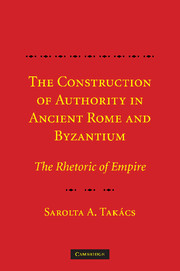Book contents
CHAPTER TWO - Empire of Words and Men
He who names it and frames it, claims it
Published online by Cambridge University Press: 15 October 2009
Summary
Augustus's Achievements: A Memory Shaped
Augustus (r. 27 BCE–14 CE) fared infinitely better than his maternal great-uncle, Julius Caesar, whom nobles, preferring oligarchic over monarchic rule, murdered. Augustus consolidated power, helped by a civil war that had wiped out most of Rome's nobility, and emerged as the unquestioned singular authority of the state. When the political structure changed from the republic to the principate, the all-absorbing father subsumed all the highest political and religious positions. Augustus assumed all that was considered positive, including the traditional virtues, but he also pronounced the uncompromising “no” in the form of prohibitive laws. This Father then was himself beyond all rules, because, in a tautological twist, he said that he was. Roman emperors, because of their socio-political, economic, legal, and religious standing, were extraordinary beings. Their extraordinariness gave rise to a symbolic authority. As such, their function was twofold: first, to embody the rules through which others could be integrated into this symbolic order, and, second, to uphold the socio-symbolic structure by which Roman society defined itself.
In his writings, Cicero had shaped the virtuous Roman. He did so at a time of great political change, as the republic gave way to the rule of one. Cicero was a key figure in the formation of a tradition that upheld the prestige and authority of Rome. His historical narrative was based on the conviction that the ruling orders, men of senatorial and equestrian rank, shared the same republican traditions.
- Type
- Chapter
- Information
- The Construction of Authority in Ancient Rome and ByzantiumThe Rhetoric of Empire, pp. 40 - 80Publisher: Cambridge University PressPrint publication year: 2008



